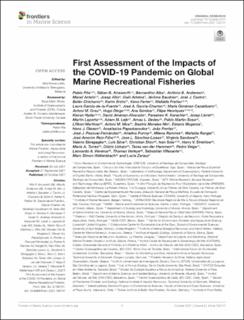First Assessment of the Impacts of the COVID-19 Pandemic on Global Marine Recreational Fisheries
| dc.contributor.author | Pita, Pablo | |
| dc.contributor.author | Ainsworth, Gillian B. | |
| dc.contributor.author | Alba, Bernardino | |
| dc.contributor.author | Anderson, Antônio B. | |
| dc.contributor.author | Antelo, Manel | |
| dc.contributor.author | Alós, Josep | |
| dc.contributor.author | Artetxe, Iñaki | |
| dc.contributor.author | Baudrier, Jérôme | |
| dc.contributor.author | Castro, José J. | |
| dc.contributor.author | Chicharro, Belén | |
| dc.contributor.author | Erzini, Karim | |
| dc.contributor.author | Ferter, Keno | |
| dc.contributor.author | Freitas, Mafalda | |
| dc.contributor.author | García-de-la-Fuente, Laura | |
| dc.contributor.author | García-Charton, José A. | |
| dc.contributor.author | Giménez-Casalduero, María | |
| dc.contributor.author | Grau, Antoni M. | |
| dc.contributor.author | Diogo, Hugo | |
| dc.contributor.author | Gordoa, Ana | |
| dc.contributor.author | Henriques, Filipe | |
| dc.contributor.author | Hyder, Kieran | |
| dc.contributor.author | Jiménez-Alvarado, David | |
| dc.contributor.author | Karachle, Paraskevi K. | |
| dc.contributor.author | Lloret, Josep | |
| dc.contributor.author | Laporta, Martin | |
| dc.contributor.author | Lejk, Adam M. | |
| dc.contributor.author | Dedeu, Arnau L. | |
| dc.contributor.author | Martín-Sosa, Pablo | |
| dc.contributor.author | Martínez, Lllibori | |
| dc.contributor.author | Mira, Antoni M. | |
| dc.contributor.author | Morales-Nin, Beatriz | |
| dc.contributor.author | Mugerza, Estanis | |
| dc.contributor.author | Olesen, Hans J. | |
| dc.contributor.author | Papadopoulos, Anastasios | |
| dc.contributor.author | Pontes, João | |
| dc.contributor.author | Pascual-Fernández, José J. | |
| dc.contributor.author | Purroy, Ariadna | |
| dc.contributor.author | Ramires, Milena | |
| dc.contributor.author | Rangel, Mafalda | |
| dc.contributor.author | Reis-Filho, José Amorim | |
| dc.contributor.author | Sánchez-Lizaso, Jose L. | |
| dc.contributor.author | Sandoval, Virginia | |
| dc.contributor.author | Sbragaglia, Valerio | |
| dc.contributor.author | Silva, Luis | |
| dc.contributor.author | Skov, Christian | |
| dc.contributor.author | Sola, Iván | |
| dc.contributor.author | Strehlow, Harry V. | |
| dc.contributor.author | Torres, María A. | |
| dc.contributor.author | Ustups, Didzis | |
| dc.contributor.author | van der Hammen, Tessa | |
| dc.contributor.author | Veiga, Pedro | |
| dc.contributor.author | Venerus, Leonardo A. | |
| dc.contributor.author | Verleye, Thomas | |
| dc.contributor.author | Villasante, Sebastián | |
| dc.contributor.author | Weltersbach, Marc Simon | |
| dc.contributor.author | Zarauz, Lucía | |
| dc.date.accessioned | 2022-01-18T09:00:40Z | |
| dc.date.available | 2022-01-18T09:00:40Z | |
| dc.date.created | 2021-12-03T11:20:36Z | |
| dc.date.issued | 2021 | |
| dc.identifier.citation | Frontiers in Marine Science. 2021, 8 . | en_US |
| dc.identifier.issn | 2296-7745 | |
| dc.identifier.uri | https://hdl.handle.net/11250/2837812 | |
| dc.description.abstract | This work is the result of an international research effort to determine the main impacts of the COVID-19 pandemic on marine recreational fishing. Changes were assessed on (1) access to fishing, derived from lockdowns and other mobility restrictions; (2) ecosystems, because of alterations in fishing intensity and human presence; (3) the blue economy, derived from alterations in the investments and expenses of the fishers; and (4) society, in relation to variations in fishers’ health and well-being. For this, a consultation with experts from 16 countries was carried out, as well as an international online survey aimed at recreational fishers, that included specific questions designed to capture fishers’ heterogeneity in relation to behavior, skills and know-how, and vital involvement. Fishers’ participation in the online survey (5,998 recreational fishers in 15 countries) was promoted through a marketing campaign. The sensitivity of the fishers’ clustering procedure, based on the captured heterogeneity, was evaluated by SIMPER analysis and by generalized linear models. Results from the expert consultation highlighted a worldwide reduction in marine recreational fishing activity. Lower human-driven pressures are expected to generate some benefits for marine ecosystems. However, experts also identified high negative impacts on the blue economy, as well as on fisher health and well-being because of the loss of recreational fishing opportunities. Most (98%) of the fishers who participated in the online survey were identified as advanced, showing a much higher degree of commitment to recreational fishing than basic fishers (2%). Advanced fishers were, in general, more pessimistic about the impacts of COVID-19, reporting higher reductions in physical activity and fish consumption, as well as poorer quality of night rest, foul mood, and raised more concerns about their health status. Controlled and safe access to marine recreational fisheries during pandemics would provide benefits to the health and well-being of people and reduce negative socioeconomic impacts, especially for vulnerable social groups. | en_US |
| dc.language.iso | eng | en_US |
| dc.title | First Assessment of the Impacts of the COVID-19 Pandemic on Global Marine Recreational Fisheries | en_US |
| dc.type | Peer reviewed | en_US |
| dc.type | Journal article | en_US |
| dc.description.version | publishedVersion | en_US |
| dc.source.pagenumber | 24 | en_US |
| dc.source.volume | 8 | en_US |
| dc.source.journal | Frontiers in Marine Science | en_US |
| dc.identifier.doi | 10.3389/fmars.2021.735741 | |
| dc.identifier.cristin | 1964127 | |
| cristin.ispublished | true | |
| cristin.fulltext | original | |
| cristin.qualitycode | 1 |
Tilhørende fil(er)
Denne innførselen finnes i følgende samling(er)
-
Articles [3001]
-
Publikasjoner fra CRIStin [3025]
